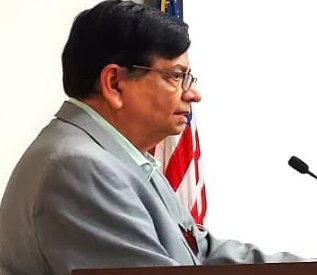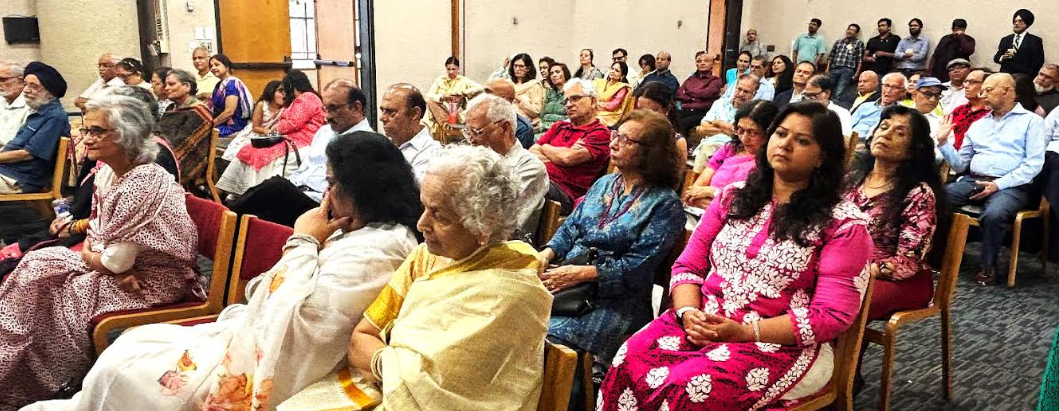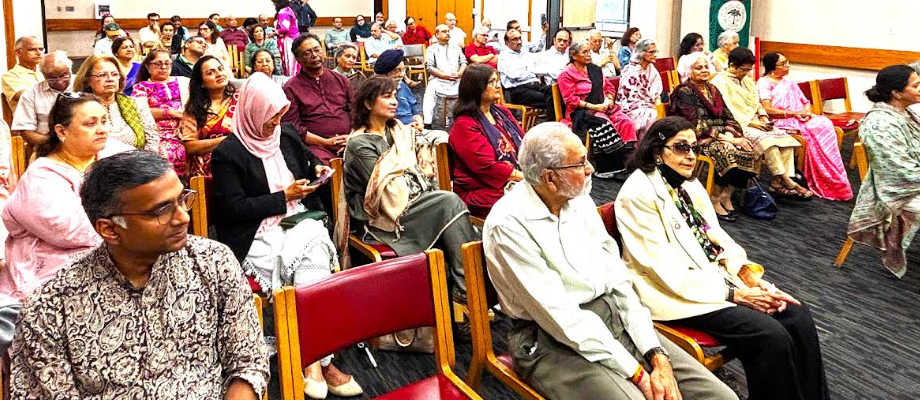America
Seventeenth Annual Mushaira–Kavi Sammelan Celebrates South Asia’s Shared Heritage in Washington, DC

The Metro Washington chapters of the Global Organization of People of Indian Origin (GOPIO-Metro Washington) and the Aligarh Alumni Association (AAA-DC) jointly hosted the 17th Annual Mushaira–Kavi Sammelan on Saturday, September 6, 2025, at the Montgomery County Executive Building Auditorium in Rockville, Maryland. The program was co-sponsored by several local literary and cultural organizations, including the Association of Indian Muslims (AIM), the Hyderabad Association of the Washington Metro Area (HAWMA), the Montgomery Nawabs (MONA), the Global Beat Foundation (GBF), the Bazm-e-Harf-o-Sukhan (BHS), and RR K Biosciences.

Origins and Growth
Program Coordinator Dr. Zafar Iqbal welcomed the audience. He recalled the event’s origins in 2008 as a forum to commemorate Yaum-e-Azadi (South Asia’s Independence Day) through poetry in both Urdu and Hindi. Conceived by Drs. Renuka Misra and Zafar Iqbal (GOPIO-Metro Washington) and Dr. A. Abdullah (AAA-DC), the Mushaira–Kavi Sammelan has since become an annual tradition celebrating South Asia’s shared Ganga–Jamuni cultural heritage.
A milestone was reached in 2011, when the Embassy of India joined GOPIO and AAA-DC to host the first international bilingual poetry recitation—an initiative inspired by Dr. Virandar Paul (my colleague from the All-India Institute of Medical Sciences, New Delhi), then Minister at the Indian Embassy in Washington. This recognition solidified the event as a platform for cultural diplomacy.
This year, Mr. Vivek Chaudhary, First Secretary at the Embassy of India, applauded the organizers for presenting an inspiring and meaningful program.
Literary Contributions
A defining feature of the Mushaira–Kavi Sammelan has been its encouragement of literary talent in the diaspora, often marked by book launches of both emerging and established writers. Over the years, the stage has hosted acclaimed authors and poets such as Prof. Satyapal Anand, Prof. Asghar Wajahat, Dr. A. Abdullah, Dr. K. Mohan, Raj Kumar Qais, Anadi Naik, Dr. Astha Naval, Dhananjaya Kumar, Rashmi Sanan, Farah Kamran, Surinder Deol, Daler Deol Aashna, Salman Akhtar, and Prof. Gopichand Narang.

The 2025 session featured an impressive lineup of poets, including A. Abdullah, Astha Naval, Harish Naval, Madhu Maheshwari, Mohammed Akbar, Mohammed Jaweed, Narendra Tandon, Nisha Narayan, Preethi Govindaraj, Razi Raziuddin, Rizwan Ali, Sarwat Parvez, Sarwat Zehra, Shamsa Najam, Sneh Sudha, Sukesh Chopra, Tabassum, Uday Kamath, Vinita Tiwari, Vishakha Thaker, and Yusuf Rahat.
Highlights of 2025 Program
The session was presided over by Dr. Harish Naval, an acclaimed satirist and author of more than 40 books, as well as a recipient of the Yuva Jnanpith Prize. He enriched the proceedings with his literary observations.
The program was conducted with elegance by Mohammed Akbar, who also introduced poets with verses of his own.
Dr. Mohammad Haziq served as master of ceremonies, and Dr. Salman Rashid delivered the vote of thanks.
The gathering also paid warm tributes to late senior poets of the Washington area—Professor Satyapal Anand, Aziz Qureshi, and Rakesh Khandelwal—as well as to eminent Urdu scholars Professor C.M. Naim (University of Chicago) and Professor Tahsin Siddiqi (University of Michigan, Ann Arbor).

Guests and Partners
Special guests included representatives of partner organizations and the Embassy of India. Recognized for their continued support were Ms. Ariena Rashid (AAA-DC), Dr. Renuka Misra (GOPIO), Mr. Kaleem Kawaja (AIM), Mr. Mir Zahid Ali (HAWMA), Dr. Mohammad Akbar (MONA), Ms. Nuzaira Azam (GBF), Dr. Arif Mahmood (BHS), and Dr. Qazi Hamid (R K Biosciences).
Cultural Impact
By bringing together poets from both Urdu and Hindi traditions, the Mushaira–Kavi Sammelan bridges linguistic divides and highlights the deep interconnections between vocabulary, idiom, and poetic form. Over the years, it has drawn audiences ranging from students and families to immigrants, longtime residents, and diplomats, fostering interfaith understanding and intergenerational bonds within the diaspora. Its continuity and inclusiveness ensure that South Asia’s literary heritage remains vibrant in the Washington, DC area.
The author gratefully acknowledges Mr. Aslam Azad and Mr. Mohammad Haziq for providing photographs.



































